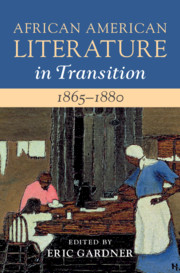Book contents
- African American Literature in Transition, 1865–1880
- African American Literature in Transition
- African American Literature in Transition, 1865–1880
- Copyright page
- Contents
- Figures
- Contributors
- Preface
- Chronology
- Black Reconstructions: Introduction
- Part I Citizenships, Textualities, and Domesticities
- Part II Persons and Bodies
- Part III Memories, Materialities, and Locations
- Chapter 9 The Civil War in African American Memory
- Chapter 10 African American Literature of the West and the Landscape of Opportunity
- Chapter 11 Reconstructions of the South in African American Literature
- Chapter 12 “This Is Especially Our Crop”: Blackness, Value, and the Reconstruction of Cotton
- Index
Chapter 11 - Reconstructions of the South in African American Literature
from Part III - Memories, Materialities, and Locations
Published online by Cambridge University Press: 18 March 2021
- African American Literature in Transition, 1865–1880
- African American Literature in Transition
- African American Literature in Transition, 1865–1880
- Copyright page
- Contents
- Figures
- Contributors
- Preface
- Chronology
- Black Reconstructions: Introduction
- Part I Citizenships, Textualities, and Domesticities
- Part II Persons and Bodies
- Part III Memories, Materialities, and Locations
- Chapter 9 The Civil War in African American Memory
- Chapter 10 African American Literature of the West and the Landscape of Opportunity
- Chapter 11 Reconstructions of the South in African American Literature
- Chapter 12 “This Is Especially Our Crop”: Blackness, Value, and the Reconstruction of Cotton
- Index
Summary
Sherita Johnson considers a region much more associated with African Americans in Reconstruction in her “Reconstruction of the South in African American Literature.” Johnson examines the transformations of a place, people, and Black literary tradition(s) responding to the political and cultural conflicts of the era and finds that Elizabeth Keckley, Frances Ellen Watkins Harper, William Wells Brown, James Madison Bell, Albery A. Whitman and Pauline Hopkins all present “Black witnesses” to Reconstruction in their works: slaves emancipating themselves, freedmen and women staking claims to Southern homes built by generational struggles, and black citizens enacting the promises of democracy. Ultimately, her chapter provides case studies of diverse texts – travel narratives, epic poems, autobiographical sketches, and moral theatre – to consider how such works by African American writers help to correct the historical record of Reconstruction and of Southern literary history.
Keywords
- Type
- Chapter
- Information
- African American Literature in Transition, 1865–1880Black Reconstructions, pp. 259 - 283Publisher: Cambridge University PressPrint publication year: 2021

